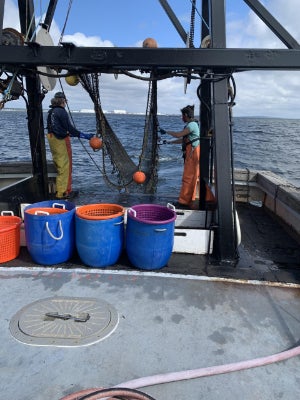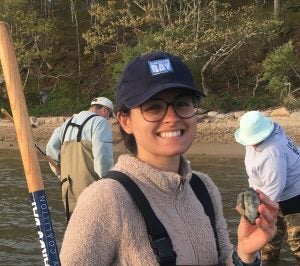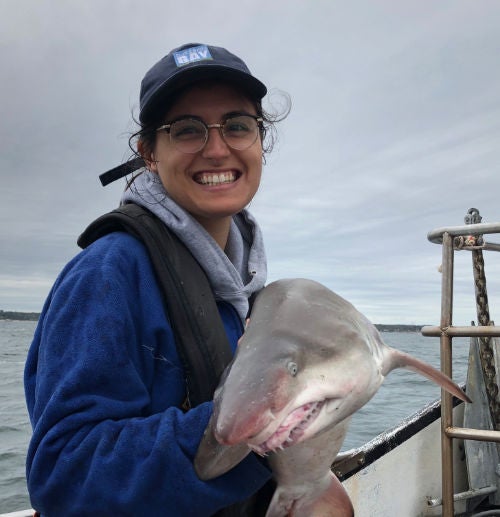May 20, 2021
Welcome to the fifteenth in our continuing series: GSO Profiles. Each post will feature a brief interview with a member of the GSO community. For the next few weeks we will feature GSO students who graduated over the past year. These profiles are one way we can celebrate the accomplishments of those graduating in this unusual time of COVID-19, and also welcome them to the ranks of GSO alums.
Growing up as the daughter of a scallop fisherman who sometimes worked with marine scientists motived Nina Santos to seek out a career in ocean science. Now she is well on her way. Last December she finished her master’s in science with GSO professor Kelton McMahon, and she has already started a Ph.D. program in Maryland. With her interests in research, education and policy, no doubt we will be hearing more from Nina in the years ahead!
Here’s Nina in her own words:
GSOP: Tell us about your work/research at GSO: what question(s) are you trying to answer?
NS: My research at GSO was focused on trying to understand the feeding ecology of Atlantic cod and black sea bass in southern New England.
GSOP: What is your favorite thing about your work?
NS: My favorite thing about my work is that it highlights the potential ecological impacts of species like the black sea bass that are becoming more abundant in the region due to climate change.
GSOP: What led you to your studies/career in ocean science?
NS: My father was a scallop fisherman and so I was inspired to pursue a career in ocean science since I was introduced to the ocean and fisheries at a really young age. Sometimes scientists from WHOI would go on some of my Dad’s fishing trips to conduct research and I remember thinking that I wanted to be like them when I grew up.
GSOP: What brought you to GSO?

NS: I came to GSO because I wanted to get some hands-on research experience and I thought the research going on at GSO, especially in Dr. McMahon’s lab, was really exciting.
GSOP: How have the COVID precautions affected you? What was it like defending your thesis virtually?
NS: Luckily, I was pretty far along with my research by the time the pandemic started, so I wasn’t too affected by COVID precautions. I was a bit sad about having to defend my research virtually, but I think it ended up being a good thing because lots of friends and family were able to attend my virtual defense who may not have been able to attend if it was in-person.
GSOP: Who have been your role models or mentors?
NS: I think that some of my biggest mentors and role models while I was at GSO, besides my advisor GSO professor Kelton McMahon, were my fellow graduate students, especially those who were further along with their studies and in particular Joseph Langan and Samantha Setta.
GSOP: What do you do for fun?
NS: A lot of what I like to do for fun involves being outdoors. I like nature walks, biking, hiking, and hanging out at the beach. I also like to paint and draw and even got to take some pottery classes during my time in RI.
GSOP: What is your favorite spot or view at GSO?
NS: My favorite spot at GSO is the GSO beach. I liked to walk down to the beach on warm, sunny days and eat my lunch with a view of the Endeavor and Narragansett Bay.
GSOP: What is your advice for someone considering ocean science for their academic/professional career?
NS: My advice is to reach out to people who have careers or jobs you are interested in to find out how they got to be in that position, and what they think you can be doing to prepare for a career like theirs.
GSOP: If you have had some time since your defense, what have you been doing since you finished your degree?

NS: Since I finished my degree, I have started a Ph.D. with Dr. Ryan Woodland at the University of Maryland’s Chesapeake Biological Laboratory. There I have been investigating the diet and prey preferences of Neomysis americana, a species of mysid, in order to inform a predictive food web model. It involves laboratory feeding experiments as well as measurements of mysids collected in the field for gut content analysis, bulk stable isotope analysis, and compound specific stable isotope analysis. It is good to expand on everything I learned at URI-GSO at my new institution and to continue to work towards a career in ocean science.

